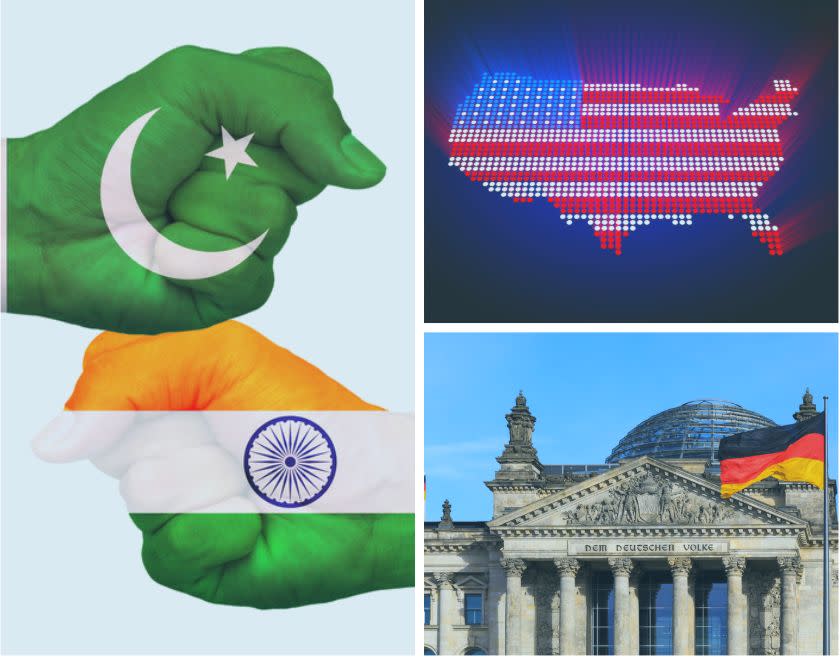$10 billion and 6 weeks long: These are election costs around the world

Australian politicians are no strangers to splashing cash on campaigns, with the Australian Electoral Commission clocking in the 2016 double dissolution cost at a whopping $287 million.
The House of Representatives and half-senate election in 2007, where Kevin ‘07 led Labor’s landslide 23-seat win, even racked up a massive $163 million bill.
But these figures are just India and the US’ spare change.
As Aussies across the nation are gearing up for this Saturday’s Federal Election, Yahoo Finance has taken a look at election costs around the world:
Related article: Labor promises $1 BILLION for 3-hour east coast fast rail link
Related article: Can a rate cut decide an election?
Related article: Here's what could decide Australia's vote
India
Total cost: $10 billion
More than 16 million (16.4 million to be exact) eligible Australians will be casting their votes and deciding the fate of 1,514 total candidates.
If that sounds big to you, India is larger than life.
In India, Forbes reports over 830 million people have been voting since 11 April, for over 8,000 candidates from 450 different political parties, and will continue to vote until this coming Sunday.
The candidates are fighting for 545 seats in the House of Representatives equivalent, the Lok Sabha.
India’s 2014 election saw the parties fork out Rs$350 billion (AU$7.1 billion), but the New Delhi-based Centre for Media Studies expects this year’s election to cost an unprecedented Rs$500 billion (AU$10 billion).
United States
Total cost: $9.3 billion
It was arguably one of the most controversial elections to take place, and it saw billionaire mogul, Donald Trump, win the majority of electoral votes with a total of 306 electors from 30 states over his competitor, Hilary Clinton.
Sitting just behind India by a slim $700 million, the combined cost of the US’ 2016 congressional and presidential races was US$6.5 billion (AU$9.3 billion).
According to The Washington Post, Clinton raised US$1.4 billion (AU$2 billion) during her campaign, while Trump raised US$957.6 million (AU$1.4billion). Both parties spent almost entirely what they raised.
Of the smaller candidates, Bernie Sanders of the Democrats Party raised US$234.3 million (AU$334 million), while Ted Cruz of the Republican Party raised US$93.2 million (AU$133 million).
Japan
Total cost: $973 million
A far cry from India’s 6-week long election campaigns, in Japan, campaigns are limited to 12 days by law.
According to The Tokyo Review, another point of difference is the election deposit that’s required to run for political office in Japan, which is no small fee.
A deposit will set back potential candidates $78,324 if they choose to run for the House of Representatives, and half of that ($39,149) to run for the House of Councillors, or if they’re running for both, it’ll cost them $117,396.
Whichever candidate wins the election gets to claim all the deposits.
According to the Japan Times, who referenced internal affairs ministry data, between $804 million and $973 million in taxpayer money was used in each of the last six Lower House elections between 2000 and 2014.
United Kingdom
Total cost: $262 million
The UK’s snap 2017 General Election cost a total of $262 million according to Politico, which is just $2 million less than the 2016 referendum cost.
In fact, during referendums in the UK, there are fairly stringent spending rules, which put $13 million limits on both the Vote Leave and Britain Stronger parties.
The country’s 2015 election that saw David Cameron win the majority for Conservatives was a little less costly.
According to Her Majesty’s Government the total paid from the UK Government’s Consolidated Fund for the costs of the 2015 UK Parliamentary general election was $214 million.
Germany
Total cost: $148 million
German political candidates are only allowed one TV ad, which means for the major parties, the CDU (Christian Democratic Union) and the SPD (Social Democratic Party), that’s eight times on each channel over the course of the campaign.
Angela Merkel secured a fourth term as a German chancellor in the country’s September 2017 election, despite it being the CDU’s worst electoral performance since 1949.
The election cost a total of $148 million, which is miniscule in comparison to the US and India.
Australia will head to the polls on Saturday 18 May.
Make your money work with Yahoo Finance’s daily newsletter. Sign up here and stay on top of the latest money, property and tech news.

 Yahoo Finance
Yahoo Finance 